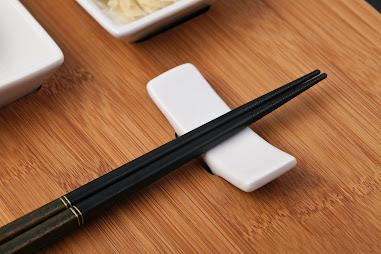从更深的层面来讲,在《黄帝内经》里,东南西北其实意义很深长。东方为生发(肝),南方为生长(心),西方为收敛( 肺),北方为收藏(肾)。
那中间是什么呢?中间为土为脾,它就是化。从生发,生长,收敛,收藏的变化过程就是化。可以用易经乾卦的用九’见群龙无首,吉’来解释。当四条龙连接在一起形成一个大圆圈, 你看不到他的头,也看不到他的尾,这就是周而复始。那就是春夏秋冬万物的变化。
春为生发,春天为什么叫春天?春这个字来自于蠢蠢欲动的蠢。春天万物都要开始蠢蠢欲动的动起来。所有的植物都会在春天生长,因此春天属木。东这个字是古代怎么写的?东这个字是木中间加了一个日。太阳在东方从树木中缓缓升起,这就是一种渐渐上升的状态。东为肝,肝主血。(所有离开胃和肠的血液都经过肝脏。肝脏处理这些血液并分解、平衡和创造营养,并将药物代谢成更容易用于身体其他部位或无毒的形式 )
再看看西这个字,古时候的人怎么写这个字?它是一只大鸟站在自己的鸟窝上因为傍晚(属金)鸟儿知道要归巢了,傍晚如果你抬头看看西边天空是金色的。天地万物也知道有收敛了,这其实是一种收敛之想。西为肺。
之前我所说东西之所以叫东西是因为东方为木,西方为金。木和金都可以用来制造东西。更深一层的想东为生发,发展赚钱和开拓的性质,赚了钱就要把它收好(收敛),那是西方的金。
而夏天的夏其实是从假日的假而来,放假的假;万物放松精神。夏天为火,火是散发。之前说中医里我们说心是属火的,所以心脏是把血液散发出去的一个人体重要的器官。
而冬天的冬由始终的终而来,冬天是万物收藏力量的季节,冬为收藏。冬为水,肾为水。我们不能只散发,不吸收。肾的收藏能力也好,我们的心的发布能力才会越强,这意味着我们才有精力去回馈社会。
古人打仗为什么开战的时候要敲锣打鼓?
古人打仗,战斗刚开始的时候,一定要敲鼓以此来振奋士气,因为鼓以木造成, 中医肝胆为木。敲打鼓让士兵们的胆气上来,他们才有足够的勇气和胆量往前冲,木为肝胆。
有一句成语叫鸣金收兵,金属于收敛之象因此古人在要收兵的时候就会敲打金属乐器。
筷子和走路都有阴阳的道理。
筷子也体现了中国传统文化的阴阳之道。两根筷子就是一阴一阳,我们用筷子的时候,动的那个就是阳;不动的,就是阴。
走路都体现了阴阳之道。我们走路的时候动的那只脚就是阳。不动那只脚就是阴,我们走路不可能两只脚都动,必须要一动一静。才可以走得动。
这再次证明了五行和阴阳并不仅限于风水命理,它们体现在我们的生活中的方方面面。
From a deeper level, in the
"Huangdi Neijing", the east, south, west and north 4 directions are
actually very meaningful. The east is for germinal (liver), the south is for
growth (heart), the west is for convergence (lung), and the north is for
collection (kidney).
What's in the middle? In the middle
is the earth and the spleen, which is transformation. The changing process from
germinate, growth, convergence and collection is transformation. It can be
explained by the use of nine 'seeing a group of dragons without heads,
auspicious' in the Qian hexagram of the Book of Changes. When the four dragons
are connected together to form a big circle, you can't see his head and you
can't see his tail, it's a cycle. That is the change of all things in spring, summer,
autumn and winter.
Spring is for growth, why is spring
called spring? The word spring comes from the wanting to move. In spring,
everything is about to start moving. All plants grow in spring, so spring is
wood. How was the word eastern written in ancient times? The word east is a Sun
added to the middle of the wood. The Sun rises slowly from the trees in the
east, which is a state of gradual rise. The east is the liver, and the liver
governs blood. (All the blood leaving the stomach and intestines passes through
the liver. The liver processes this blood and breaks down, balances, and
creates the nutrients and also metabolizes drugs into forms that are easier to
use for the rest of the body or that are nontoxic)
Let's look at the word
"West" again. How did people write this word in ancient times? It's a
big bird standing on its own nest because in the evening (gold) the bird knows
it's coming home, and in the evening if you look up at the west the sky is
golden. All things in the world also know that there is convergence. West is
the lung.
What I said before we call ‘thing’ as
‘east west’ in Chinese because the east is wood and the west is gold. Both wood
and gold can be used to make things. A deeper level of thinking is that the
East is for growth, to develop the nature of making money and pioneering. When
you make money, you must take it well (convergence), that is the gold of the
West.
The word summer in Chinese actually
comes from the word holiday, during holiday; everything relaxes the spirit.
Summer is fire, and fire is radiating and spreading. Earlier, in Chinese
medicine, we said that the heart belongs to fire, so the heart is an important
organ of the human body that emits and spread the blood.
The word winter comes from the Chinese
word start and end. Winter is the season when all things collect power, and
winter is the collection. Winter is water, and kidney is water. We cannot just
emit and not absorb. The better the collection ability of the kidney, the
stronger the ability of our heart to release, which means that we have the
energy to give back to the society.
Why did the ancients beat gongs and drums when they went to war?
When the ancients fought a war, at
the beginning of the battle, they must beat drums to boost morale, because
drums are made of wood. Beating the drums can boost the soldiers courageous, 中医肝胆为木and they had enough courage to fight forward and it is
believed that by beating the gongs and drums that made by the wood would boost the
soldiers courageous.
There is an idiom called by beating
the metal means to withdraw army troops, and metal is the image of convergence,
so the ancients would beat metal musical instruments when they were about to
withdraw troops.
Chopsticks and walking have yin and yang principles.
Chopsticks also embody the yin and
yang principles of traditional Chinese culture. Two chopsticks are one yin and
one yang. When we use chopsticks, the one that moves is yang; the one that
doesn't move is yin.
Walking reflects the way of yin and
yang. The foot we move when we walk is yang. The foot that doesn't move is the
yin. We can't walk with both feet moving, we must move with one leg moves and
another leg stay still.
This once again proves that the five elements and yin and yang are not limited to Feng Shui numerology, they are embodied in every aspect of our life.








No comments:
Post a Comment